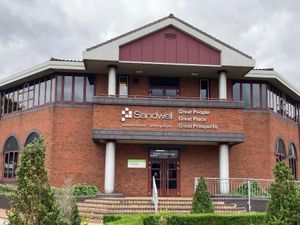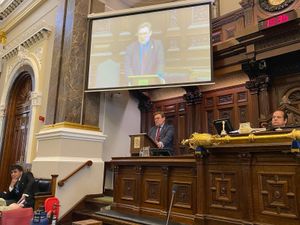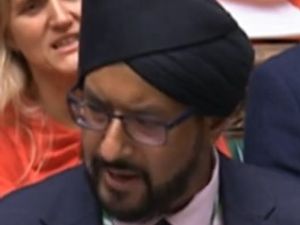Brexit Secretary answers YOUR questions
Stephen Barclay has responded to eight readers' questions - and claims he is confident Theresa May's deal will be voted through.
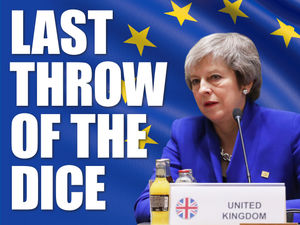
The Brexit Secretary today tells Express & Star readers he is confident Theresa May’s EU deal will be backed by Parliament.
Responding to questions from readers, Stephen Barclay insisted the Prime Minister’s Brexit deal was the best available for people in the Black Country and Staffordshire.
And despite what appears to be mass opposition from MPs across parties, Mr Barclay insisted the Government would deliver the deal.
He also dismissed the possibility of a second referendum – branding it ‘a betrayal of democracy’.
Scroll down for the questions and answers in full
He warned of ‘uncertainty and disruption’ should the Prime Minister’s deal get rejected, but claimed the UK would be able to make a success of a ‘no deal’ Brexit.
Mr Barclay, who recently replaced Dominic Raab as Brexit Secretary and backed Leave in the EU referendum, also ruled out an extension to Article 50, saying he was certain the UK would depart the EU by March 29.
Confident
The Prime Minister and her top team have spent the last 10 days on an all-out mission to persuade MPs and the public that the Government’s deal is the best one available for Britain.
Mr Barclay said: “I am confident that we will deliver the deal. The alternative to this good deal is either no deal or even no Brexit.
“The deal we have on the table is one that the people of this country can get behind, and we hope and expect Parliament to vote in the interests of their constituents and support it.”
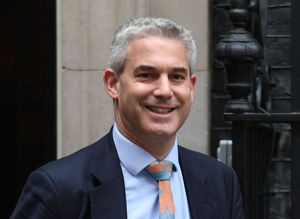
With around two thirds of MPs seemingly set to oppose the Prime Minister’s deal, the prospect of leaving the EU without an agreement has become a major talking point.
Mr Barclay described such a scenario as ‘unlikely’ and ‘undesirable’, but he insisted that the Government was fully prepared for crashing out of the EU without a deal.
More on Brexit:
Asked why the Government was against another EU referendum, Mr Barclay said: “Any second referendum would be a betrayal of democracy – we cannot, and should not, ignore what people voted for in the referendum.”
MPs are set to vote on Mrs May’s Brexit deal tomorrow evening after a final day of debating the issue.
Full questions and answers:
1. From Michael
Q: As a Brexiteer, you must realise that Theresa May’s deal keeps us tied to the EU. How can you possibly support something which means we pay £39 billion just so the EU can continue to impose laws on us?
A: Michael, not at all, and as a Brexiteer I would like to reassure you that this deal does exactly the opposite. This deal ends the jurisdiction of the European Courts, allows us to better allocate domestic funding, and lets us set our own immigration framework. We’ve agreed to settle our obligations as departing members of the EU - we are a country that plays by the rules and honours its obligations: to do anything else would be wrong. The financial settlement means that EU projects which the UK, and British individuals and businesses, started while we were an EU member can be completed as planned, and won’t need to fall back on the government’s funding guarantee. It is much lower than some of the estimates some suggested earlier in this process, which put the up front cost as high as £100 billion! It’s also important to note that this has been agreed in the spirit of our future relationship - it’s worth remembering that this is something that comes as part of the rest of the package.
2. From Keiron
Q: Will you answer the question that no one in the Government seems keen on answering? If (and when) the Prime Minister’s deal is voted down in Parliament, what happens next? Is there a Plan B?
A: Firstly Keiron, I am confident that we will deliver the deal. The alternative to this good deal is either no deal or even no Brexit. Leaving without a deal would mean increased disruption and uncertainty for people and businesses across the UK, and would not protect the Belfast (Good Friday) agreement which ensures peace on the island of Ireland. The deal we have on the table is one that the people of this country can get behind, and we hope and expect parliament to vote in the interests of their constituents and support it
3. From Biffa
Q: The Bank of England warned that in a worst case scenario, crashing out of the EU with no deal would lead to an economic slump, the collapse of the pound, and see food prices soar. It it right, or is it talking balderdash?
A: Firstly, I want to assure you that we don’t want or expect no deal. And make no mistake, the deal on the table is a much better outcome than leaving without one. It delivers on the result of the referendum, and that’s why I am very happy to throw my weight behind it as a Brexiteer.
But it’s the job of a responsible government to ensure we’re prepared for all scenarios, and ensure that any potential difficulties are mitigated as much as possible. We have spent the past two years planning for a variety of outcomes and as part of this we have published 106 technical notices advising citizens and businesses on things they may need to do in the unlikely event of us leaving without a deal.
Were it to happen, there will inevitably be bumps in the road. But we have taken what steps we can to avoid this turbulence where possible and reduce it where it cannot be avoided. Make no mistake – no deal is not a desirable outcome and there would be disruption. But we are prepared and the UK is big enough and resilient enough to make a success of things, come what may.
4 From Bob Saunders
Q: It is now apparent that the terms of Brexit on offer are very different to those that people voted for in 2016. There is also increasing evidence that the public mood is changing and no consensus in the House of Commons as to how to move forward. Under these circumstances why is the Government so against going back to the people for a further referendum?
A: Bob, the people had a say when they took part in biggest democratic exercise this country has ever known. We listened to what people across the country voted for: they wanted free movement to end, annual payments to the EU to end, and for us to make our own laws. In each of these crucial areas, the deal delivers.
It is important that we now deliver on this vote. Any second referendum would be a betrayal of democracy - we cannot, and should not, ignore what people voted for in the referendum. It’s also worth noting that the vast majority of people voted for parties which committed to delivering Brexit in their manifestos in last year’s general election.
5. From Bruce
Q: So many politicians – including Labour and Conservatives – have done all they can to try and stop Brexit from happening, despite Britain voting to leave the EU. Do you agree that by leaving us in this chaotic situation, they are a disgrace to this country and the people they represent?
A: Bruce, we live in a democracy, and it’s only right that people on both sides of the debate get the chance to have their say. If you look at the deal we have negotiated, it delivers on the results of the referendum and things I campaigned for as a Brexiteer. It means we can introduce a skills-based immigration system that works for the UK, come out of the CAP and Common Fisheries Policy and make our own laws in the UK which will be enforced by British courts. It also allows us to carve our own way in the world and set our own path once again. Rejecting it would lead to uncertainty and disruption. The deal on the table is one which the people of the UK can get behind and we hope and expect Parliament can support it.
6. From Sally
Q: Why does your Government want to deny all of us freedom of movement to work, travel and live in the 27 EU countries? Freedom of movement works both ways and the Prime Minister’s proposals will deny any of our young people the right to work in Europe.
A: Thanks for your question Sally. First things first, we are not closing the doors to the UK. What we are doing is delivering a skills-based immigration system that works for the country. That’s not about pulling up the drawbridge, but it does mean we can decide how many people come to the UK and ensure we have the right people for the right jobs.
I know that many people, young and old, will want to continue to travel to the EU after we leave. Our agreement on the future means that they’ll be able to do this, with no visa needed for short term visits. And the deal means that we can decide with the EU ways that people can travel to the EU to study, take part in research, training and youth exchanges.
7. From Louis Lees
Q: With her deal, has the Prime Minister tied us to Europe for an undisclosed time scale in order to appease fellow Remainers, or has she in fact detached us from Europe in both customs and trade as of March 29 next year?
A: Hi Louis. The deal we’ve agreed with the EU means we will leave the Single Market and Customs Union. It does that by using a time-limited Implementation Period designed to ensure a smooth transition to our future trading relationship. This is important because it gives essential certainty to businesses and ordinary people up and down the UK, allowing them to plan ahead.
8. From Nelly
Q: On a scale of 1 (not at all) to 10 (very), how confident are you that we will leave the EU by March 29, 2019?
A: “That’s a 10 Nelly! I’m entirely confident. We have been negotiating with the EU for nearly two years and now have a hard-won deal that delivers on what people voted for. Nobody should be under any illusions that the EU will be prepared to start all over again and negotiate a different deal. Anything other than straightforward approval of the deal will bring with it huge uncertainty for business, consumers and citizens.
And as a committed Brexiteer, I wouldn’t have backed the deal on the table if I didn’t believe it delivered on the result of the referendum. We listened to what people across the country voted for: they wanted free movement to end, huge payments to the EU to end, and for us to make our own laws. In each of these crucial areas, the deal delivers.

